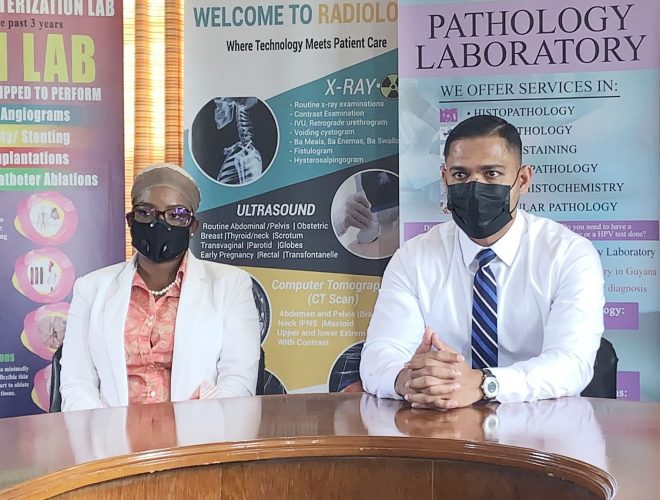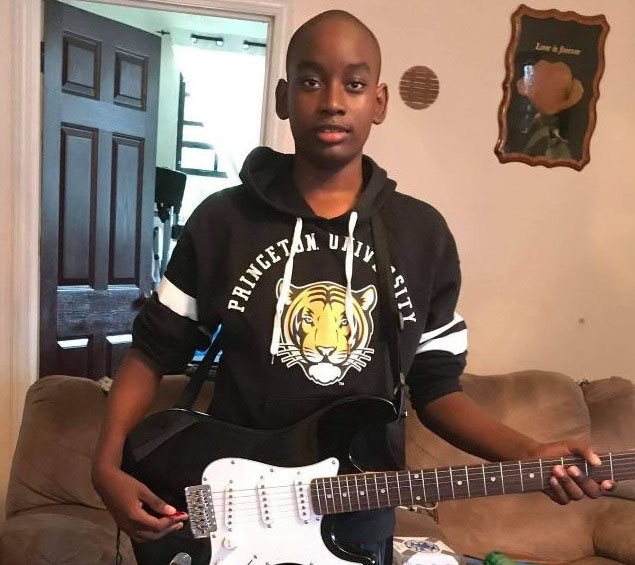Guyanese neurosurgeon, Dr Amarnauth Dukhi, on Monday performed Guyana’s first paediatric brain aneurysm surgery on a 13-year-old high school student.
Dr Dukhi led a team which conducted the successful surgery at the Woodlands Hospital in Georgetown after the teen, Ty David, was admitted to the hospital two weeks ago.
David is expected to make a full recovery.
During a press briefing at the hospital’s boardroom, the neurosurgeon said that on May 18, the paediatric department admitted David who had a sudden loss of consciousness after having a severe headache. Upon his admission, a CT scan was done which at the time showed extensive bleeding in his brain, possibly the result of a spontaneous rupture.

He added that he was called to consult on the patient and subsequently gave the presumptive diagnosis of a brain aneurysm. “Further studies, radiological studies were done and that showed that indeed this child had something what we call a brain aneurysm. Brain aneurysm is something that is more frequent in adults… Out of 100,000 kids less than 15-years-old, less than one kid will have a brain aneurysm, that’s how rare it is,” Dr Dukhi told the news conference.
The doctor went on to explain that any brain aneurysm is considered to be an extremely critical ordeal for patients. These patients, he said, cannot move, cannot travel, and must be placed in a room that is extremely dark. After similar precautions were taken, they were able to evaluate the teen again and subsequently flush the blood out of his brain and have him prepped for surgery.
According to the neurosurgeon, endovascular surgery for vascular brain disorders is extremely difficult and is considered to be the toughest neurological procedure, however, it has been performed in Guyana for over the last year and a half. This procedure, he added, is also not done in the public health sector in the country. Emphasising the rarity of the condition, the neurosurgeon noted that even during his residency he had never seen a case of a paediatric brain aneurysm. Although this was the seventh brain aneurysm procedure done here, he revealed that it was the first paediatric case
Given David’s critical condition, Dr Dukhi told members of the media that it would have been incredibly dangerous for the teen to go overseas to have the procedure done. If they were to take that risk, he said, the child would not have been able to go on a commercial flight.
Providing details on how the procedure was done, he stated that a minimally invasive brain aneurysm endovascular stenting and coiling was done and as a result they did not have to “open his head.”
“This is what we do in first world countries, what I was trained to do overseas in a subspecialty of neurosurgery and also my professor was able to come in to be part of that,” he stated. Thankfully, the procedure, he added, went well and referred to it as a text book-style surgery.
According to Dr. Dukhi they were able to go to the brain through David’s femoral artery on his right leg. “We were able to get to his brain through his femoral artery on his right leg, we went through his heart with the camera straight to his brain and we were able to find the aneurysm which was extremely huge.”
He mentioned that there are certain factors that must be taken into consideration when this type of surgery is being done. He and his team were able to put a stent where the aneurysm was found and blocked it. They were then able to “coil it.” He explained that the coil blocks the aneurysm completely away from the natural flow and causes it to disappear.
The procedure took approximately two hours to complete and the doctor reported that the young patient is already awake and up and is expected to be discharged today as they do not foresee any complications occurring in the future. While there will be follow-ups done with the teen, he should be able to go back to his normal daily activities.
“It’s also important to note that these types of procedures in a foreign country would cost a patient almost US$200,000 or more and we were able to have everything done here between 10 to 15% of that cost,” Dr Dukhi revealed.
Meanwhile, the teen’s mother, Tonna David, during the press conference praised the team of doctors and expressed her gratitude to God and the hospital. She told the media conference that she had lots of faith that the surgery would have been a success as she never wavered.
“I was just waiting on the good news right outside the theatre door and you know persons were like how are you so strong and you know I thank God for giving me the strength to go through this,” she said.
Detailing events that led to the teen’s hospitalisation, David stated that her son was just fine on the morning of May 18 and was getting prepared to attend his online classes. She mentioned that the 13 year old who is an introvert had a presentation to make for his class.
“He’s an introvert first and foremost so I think he was probably camera shy to do his presentation and it might have been nervousness and anxiety, he went to the washroom” she said, adding that he subsequently called for his grandmother and when they got to his aid he was on the floor and when they tested his blood pressure, they discovered it was extremely high to the point that he almost had a stroke.





